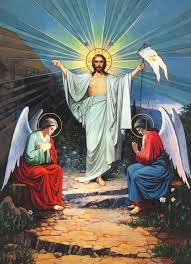After a slew of emotions that we experienced through the forty days of Lent, finally that time of the year has arrived when we have much to rejoice over! The Lord is risen: it’s Easter! Alleluia!
How did the Resurrection come to be called ‘Easter’? The ninth-century monk Venerable Bede says the name derives from Eostre, the spring month named after the pagan goddess of fertility. Others say the root of ‘Easter’ goes back to Old English, with a Germanic root related to the cardinal direction East, and yet others point to the Latin aurora, dawn. So, ‘Easter’ is only a colloquial substitute for ‘Pasch’! Be that as it may, Lent is indeed be a springtime for the soul and, if Christ be the Sun, Easter is easily a new dawn for the Christian world.
But, hugely more important than etymology is Christ We know that Christ was on a visit to the City of David, to celebrate the Jewish Passover, when He was summarily arrested and crucified. Looking back, there was no longer any use for the animal sacrifice: Christ Himself had become the Paschal Lamb. Then, with His glorious Resurrection on the third day, He introduced humankind to a New Passover, which we call Pasch or Easter.
We know that Christ was on a visit to the City of David, to celebrate the Jewish Passover, when He was summarily arrested and crucified. Looking back, there was no longer any use for the animal sacrifice: Christ Himself had become the Paschal Lamb. Then, with His glorious Resurrection on the third day, He introduced humankind to a New Passover, which we call Pasch or Easter.
Whether the ‘third day’ was meant to be a period of seventy-two hours or less is of no consequence! At any rate, the Resurrection was an unprecedented happening. The earth-shaking event established Christ’s divinity and validated all His claims and promises. Humankind had indeed met face to face with the True God. No wonder it led to the establishment of a new religion – Christianity.
Whereas our ancestors in faith met God in person and witnessed the Resurrection, many may wish to know the practical significance of the happening to our day and age. Indeed, to us, Easter is a complete gamechanger; its joy transforms us and the way we look at life. And who can fail to appreciate Christ’s message of love and compassion? Has it not made the world a better place to live in? And although physical suffering proper to the human condition lingers on, humankind has been freed from the oppression of sin.
Finally, Christ’s Resurrection is a guarantee of our eternal salvation and that we will be raised from the dead at His Second Coming. St Paul says, ‘If there is no resurrection of the dead, then Christ has not been raised. And if Christ has not been raised, our preaching is empty and our belief comes to nothing.’ (1 Cor 13-15) Hence, Resurrection is the cornerstone of our faith. Its commemoration is no hollow ritual but a meaningful commemoration; it is not just another day but a watershed in the history of salvation.
We say we are an Easter people and Alleluia is our song! This line attributed to St Augustine and popularised by St Pope John Paul is an apt description of our Christian identity. We are to be recognised not by the dress we wear or the food we eat, but by the way we conduct ourselves – with joy; by the way we treat one another – with love; and by the way we relate to our God – body and soul, with hope, praise and thanksgiving.
Easter brings us hope. With its splendour before our eyes, no matter what the circumstances, Easter is a joy for ever.
Beautiful message, dear Óscar de Noronha! Specially when there are so many dark clouds and an awful war we watch, powerless and shocked, every day, only God’s blessings and our payers for peace help me feel some joy!
Thank you, Ivette Colaço
Thank you, dear Maria Ivette Colaço! It’s always a joy to share our spiritual experiences, and particularly at Easter, an unsurpassable happening! May the Paschal hope and joy remain with you for ever!
Beautiful message
Thank you for reading, Marianita! Keep in touch with my blog. Regards.
My dear Oscar,
How masterly, you explained the Joy that all who accept Jesus, as their Lord and Savior, must experience!
Sergio
Dear Sergio, thank you for your words. My experience is summed up in the hymn, ‘In the Lord is my hope’, whose chorus is here below:
In the Lord, is my hope,
In the Lord, is my help.
He’s my shield and my strength.
He’s my fortress: I stand firm.
Have a most blessed Eastertide, you and your dear Family!